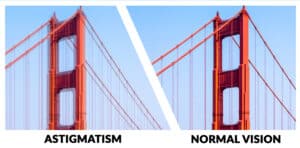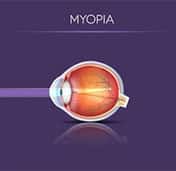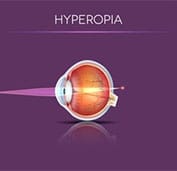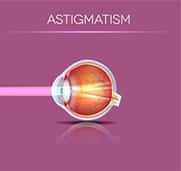
Astigmatism is a common refractive error that causes blurred or distorted vision at all distances. It occurs when the cornea or lens has an irregular shape, preventing light from focusing properly on the retina. Many people wonder if LASIK can treat astigmatism—and in most cases, the answer is yes. LASIK eye surgery uses advanced laser technology to reshape the cornea and improve how light enters the eye, often resulting in clearer, sharper vision without the need for glasses or contacts.
Home » Blog »
What Does LASIK Eye Surgery Do?
Many people hear about laser eye surgery and think, “Seeing without glasses? That sounds great! But can it fix my eyes?” The answer is that it depends. Not every condition that negatively impacts someone’s vision can be corrected by LASIK. For example, cataracts, macular degeneration, and glaucoma cannot be corrected by LASIK and require a different procedure. The good news is that today we have more technology available than ever. Most people looking to improve their vision can be candidates for some kind of vision correction procedure these days.
How Does LASIK Work?
When the cornea isn’t shaped properly to the eye, it causes light to not focus clearly. LASIK is a non-invasive eye surgery that uses a laser to reshape the cornea with a beam of cool light. Once LASIK has been performed, the light entering the eye can properly focus on the back of the retina, creating better vision. Prior to LASIK surgery, numerous tests will be performed to determine the condition of the eye and the amount of correction needed.
Schedule a LASIK Consultation at Brecksville
Schedule a LASIK Consultation at Avon Pointe
LASIK for Nearsightedness

Myopia Eye Diagram
Also called myopia, nearsightedness is an eye condition in which you can view objects up close clearly, but things farther away may appear blurry. Myopia occurs if the eyeball is too long or the cornea is too curved, which causes the light entering the eye to not focus properly. People with myopia can have difficulty clearly seeing a TV screen from across the room, a whiteboard in school, or while driving. This condition may be inherited or developed depending on how a person uses their eyes. Those who spend considerable time reading, working at a computer, or doing intense close visual work are more likely to develop myopia. LASIK does an excellent job of correcting nearsightedness.
LASIK for Farsightedness

Hyperopia Eye Diagram
Also called hyperopia, farsightedness is the inability to see near objects as clearly as distant objects. Hyperopia occurs if the eyeball is too short or the cornea isn’t curved enough for the eye, which causes the light entering the eye to not focus properly. Common signs of hyperopia include difficulty concentrating and maintaining a clear focus on near objects, eye strain, and fatigue. LASIK is a great option to correct this condition.
Does LASIK Fix Astigmatism?

Astigmatism Eye Diagram
Astigmatism is a relatively common eye condition involving an irregular curvature of the cornea. Many people have some degree of astigmatism on top of nearsightedness or farsightedness, even if it’s only minor. Physical irregularities in the cornea cause distortion of the viewed image on the retina. As a result, vision becomes blurred or doubled at any distance, and this can lead to eye discomfort and headaches. Today, LASIK can correct astigmatism by reshaping the cornea as well.
LASIK Eye Surgery: Is It Right for You?
If you’re wondering if your eyes could be corrected with laser eye surgery, then it’s important to come into ClearChoice for a free consultation. Our highly trained team will determine your eye condition during your consultation and let you know which procedures might be suitable.
ClearChoice offers LASIK alongside six other vision correction procedures. We offer multiple procedures so our doctors can match your eyes with the correction option that they think will provide the best outcome for your vision and you may have options. Schedule a consultation and get yourself on the path to better vision today!
Schedule a Free Consultation Now!













